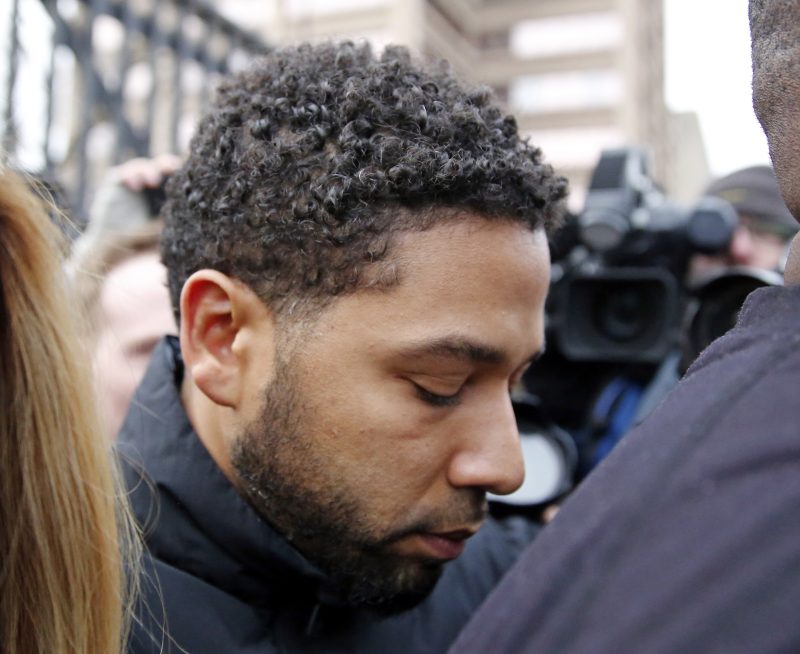US actor’s allegedly fake assault could cause ‘real harm’
(FILES) In this file photo taken on February 21, Empire actor Jussie Smollett leaves Cook County jail after posting bond on February 21, 2019 in Chicago (NUCCIO DINUZZO)
Chicago (AFP) – American advocacy groups and police have a shared concern over the fallout from allegations that an openly gay black TV actor faked a hate-motivated assault: that future victims will face more skepticism even as hate crimes are on the rise.
Chicago police have accused Jussie Smollett of engineering an elaborate hoax to exploit Americans’ anxieties over political and racial divisions in order to generate publicity and a bigger paycheck.
The 36-year-old star of the Fox drama “Empire” allegedly sent himself a threatening letter and then hired two acquaintances to stage a street attack in downtown Chicago, complete with homophobic and racial slurs, while invoking Donald Trump’s “Make America Great Again” slogan.
Smollett is charged with a felony count of disorderly conduct for filing a false police report. He was freed Thursday on $100,000 bond.
“If true, then this is a disgraceful exploitation of many past victims of real hate crimes, many of whom have endured heinous suffering,” Kami Chavis, a former assistant US attorney in the George W Bush administration, told AFP.
The actor’s lawyers, in a defiant statement, criticized law enforcement’s actions as an organized “spectacle” and maintained Smollett’s innocence.
But whatever the final result, the case has left gay rights and racial justice advocates, along with politicians and government officials, worried about future victims. Will they be believed?
– Worry over ‘skepticism’ –
“Bogus police reports cause real harm,” an angry Chicago police chief Eddie Johnson told a news conference Thursday, after detailing what his detectives learned over a three-week investigation.
“My concern is that hate crimes will now publically be met with a level of skepticism that previously didn’t happen,” Johnson said.
The initial news of the purported attack at the end of January generated an outpouring of support for Smollett, who in the past has lent his celebrity to gay rights, racial equality and other causes.
But as the case — with disturbing details such as a rope allegedly put around Smollett’s neck — appeared to turn and the actor went from victim to suspect, many who had rushed to condemn the attack were left struggling to respond.
On Friday, the producers of “Empire,” after repeatedly standing by the actor before he was officially charged, said he would be removed from the final two episodes of the current season “to avoid further disruption on set.”
Rights advocacy groups and activists fell mostly silent as details leaked out of the investigation. But they eventually focused on a common theme: hate crimes are happening with increasing frequency even if the Smollett case turns out not to be one.
– More hate crimes –
The FBI says that during the incendiary first year of President Donald Trump’s term in 2017, the number of hate crimes rose 17 percent nationwide. Last year’s figures are not yet available.
The Southern Poverty Law Center in 2018 counted an all-time high 1,020 hate groups in the United States.
The most recent report from the Anti-Defamation League found anti-Semitic incidents surged 60 percent in 2017.
In 2018, 26 transgender people were killed, most were black trans women, according to the Human Rights Campaign.
“As we learn more details about Jussie’s arrest, we remain focused on the urgent fight against the very real issues of racism, homophobia, and hate violence,” said a joint statement from Color of Change and GLAAD, which are focused on racial justice and gay rights issues, respectively.
Chavis, who is an expert on hate crimes laws and is director of the Criminal Justice Program at Wake Forest University’s law school, says hate crimes victims have already faced big obstacles.
“There is a long history of these victims not being believed,” Chavis said.
“Jussie Smollet’s actions should not deter law enforcement officials, prosecutors and jurors in future cases.”
But could it deter public support?
– Media ‘played for fools’ –
Critics have pointed out that in the initial rush to support an apparent hate crime victim, many celebrities, commentators and politicians condemned the attack with little scrutiny of the underlying claims.
“The media should be the most outraged. He played all of them for fools,” tweeted Nikki Haley, Trump’s former UN ambassador.
Politicians have had to awkwardly back-pedal from their original comments, such as Senator Kamala Harris, a Democratic 2020 presidential candidate.
She had initially called the Smollett case one of “attempted modern day lynching.”
But when asked by a reporter earlier this week on the campaign trail in New Hampshire about her thoughts on Smollett, Harris initially hesitated and appeared to grasp for a response.
On Thursday night, she posted on Facebook that she was “sad, frustrated, and disappointed,” while turning the attention back on victims.
“We must speak the truth: hate crimes are on the rise in America,” Harris said.
“Part of the tragedy of this situation is that it distracts from that truth, and has been seized by some who would like to dismiss and downplay the very real problems that we must address.”
Disclaimer: This story is published from a syndicated feed. Siliconeer does not assume any liability for the above story. Validity of the above story is for 7 Days from original date of publishing. Content copyright AFP.


